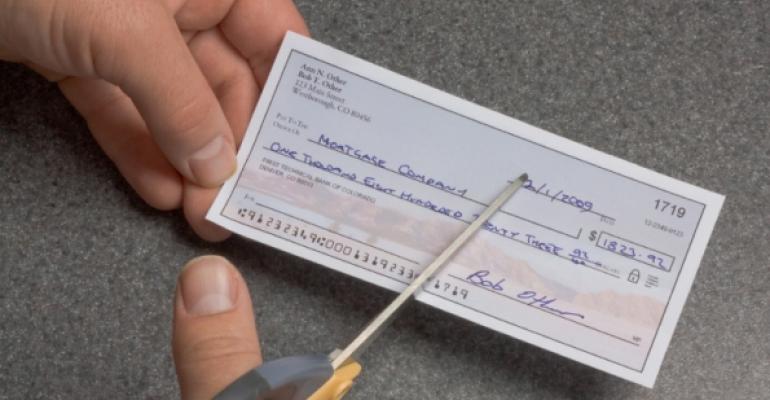Table of Contents
Updated by 11.16.2023
When Will Checks Become Obsolete?

5 Reasons Paper Checks Will Soon Be Obsolete
Nicole has had a bank account for over ten years, yet she has never owned a checkbook. She receives her salary via direct debit, shops in stores using a debit card, and pays all her bills via Internet banking. If she owes money to her friends, she’ll deposit money directly into their accounts using her bank’s facilities or external online transfer services. Every transaction Nicole makes is recorded, somehow: She has her bank’s online records, her credit and debit card statements, and e-receipts from payments made or received from friends. Nicole pulls out cash rarely: for a drink in a cash-only bar, perhaps, or for emergency groceries at the local bodega. As for a checkbook? She’s not sure she would even know how to fill out that superfluous piece of paper. Nicole is twenty-five years old.
Nicole’s grandmother, on the other hand, is lost without her customized book of checks that she proudly totes around in her alligator-skin purse. She buys her groceries, pays her bills, pays her mortgage, and gifts her grandchildren with a pale pink personalized check, printed with her name and address.
The oldies love them; the young ones hate them. As online banking becomes more prevalent, checks are becoming closer to fossilized dinosaurs than the transactional necessity they once were. In Europe, they are barely seen in the public eye. Young people under 30 aren’t sure how to fill them out. “Balancing the checkbook” has become a lost art. With the progression of technology, are checks on their way to becoming obsolete?
1. They Cost Too Much Money
Even the government doesn’t use them anymore. Since 2011, social security and pension payments in the United States have been made using direct transfer, while the traditional “food stamps” and unemployment benefits have been transferred to debit cards. While many senior citizens complained about their new paperless lifestyle, the government has saved millions in paper and postage fees.
Banks and financial institutions are increasingly providing incentives for customers to go paperless. At Bank of America, customers who opt for their online-only plan will save the $8.00 monthly checking fee, so long as their transactions are done purely online or via ATMs. Customers who receive their paychecks via direct debit, make all their payments online, and check their bank statements using the Internet are the winners here. Those who require paper statements? On the way out.
Over the past decade, online bill payment has increased 800% while paper check usage has declined from 61% of all payments in 2000 to just 26% in 2010.
2. Physical Paper Checks Are No Longer Required:
E-Complish’s ACH processing system, for example, enables checks to be taken over the phone, where the details are entered into an online system which then verifies the check and prints it, sending the funds automatically. Since 2004’s Check21, paper checks are no longer required to be kept by the bank. Enter smartphone apps by the banks, such as Chase, which enables customers to photograph or scan checks using their smartphones and deposit the funds automatically without even visiting an ATM.
3. They Take Up Too Much Time
Think about it: Grandma hands you a check for your birthday, along with her best wishes and a lipstick-stained kiss. You have to go to the ATM, deposit the check, wait for it to clear, then withdraw the funds – though it’s likely they’ll be used directly with your debit card. Personal use of checks has dropped, predominantly due to many young people noticing just how long it takes for their friends to deposit or cash the check. With many banks holding cash over $150 for a 24-hour period or longer, waiting for checks to clear is far less convenient than accepting an immediate online payment.
Checks are also a barrier when being used to make purchases at the supermarket. The old lady who whips out her checkbook in front of a long supermarket line is the most hated woman in the store – while those who head smugly to the self-checkout swipe their plastic and are done in an instant. Buying gas is a breeze when paying at the pump – entering the store to hand over a check, driver’s license, and often a home phone number is just another time-consuming add-on that in this fast-paced world is close to obsolescence.
4. Not Everyone Accepts Them
In the universe that existed prior to credit cards, personal checks were a primary method for transferring money when there was no cash on hand. While some small business owners shied away from the transaction fees incurred by accepting credit or debit cards, many were happy to accept checks from the familiar faces that graced their stores regularly. As credit and debit cards have increased in popularity, checks have often been relegated to those who prefer the comfort and safety of paper. Local businesses, wary of bounced checks or fraud, prefer the instantaneous methods of credit card payment acceptance and are less inclined to accept a check from an unknown customer. While the electronic ACH and check payment system from E-Complish, for example, enables checks to be verified immediately, many businesses that are not set up with this technology are loath to accept a check without also checking ID and taking down a home phone number.
Most service providers in the United States are now set up for direct debit payments or enable online or phone payments with credit cards. The majority of Americans prefer to pay their bills automatically each month. For many, rent is the final frontier, writing a single check each month to cover housing or mortgage payments, though increasingly, landlords are also setting themselves up to receive electronic payments. With increases in technology, such as the payment solutions available from E-Complish, it seems more likely that online payments will become increasingly prevalent – while accepting foreign checks is far less popular.
5. Check Fraud Is Still a Big Deal
The primary excuse for many people, primarily of the older generation, who prefer checks is simple: I like to use paper, and I don’t trust the electronic system. Yet for all the concerns over credit card fraud, check fraud is still a serious issue, with counterfeit check scams still creating havoc for banks in the United States and elsewhere. Check enthusiasts are glad of the ability to cancel a lost or misplaced check, and skeptical Luddites are wary of the ability for electronic information to be hacked or stolen. Banks increasingly offer credit card protection and security which will obliterate the need for additional safety of paper. In addition, online ACH systems such as the one offered by E-Complish pass on electronic check information via a secure, encrypted system, creating confidence and assurance for even the most hesitant of customers.
So What Does This Mean for Me and My Business?
Whether they prefer them for gift-giving, paper trails, or simply because it’s difficult to teach old dogs new tricks, your business doesn’t have to suffer because of stubborn checkwriters. Setting up your business to accept ACH transfers means you too can make checks obsolete. You have the option of paying your employees via direct debit, as well as accepting customer payments via online bill payment. If your customers aren’t convinced, the E-Complish Direct Check software will enable your business to minimize follow-up for the “check-is-in-the-mail” types and accept checks via phone: The system will enable you to simply input data directly into the system and print the checks automatically. The funds are paid to your account instantly, with no transaction fees. For a demo of our software schedule a consultation to learn more.
Table of Contents


